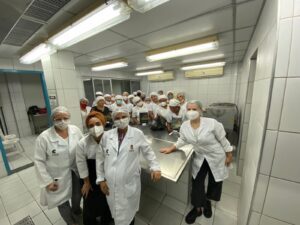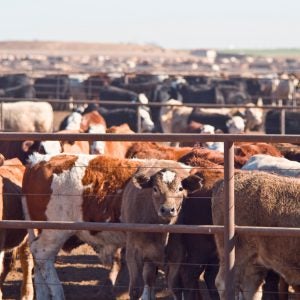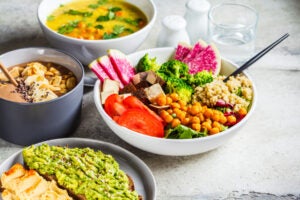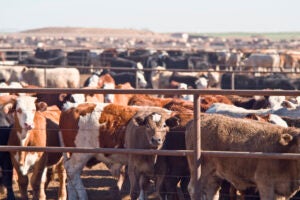
SHARM EL SHEIKH, Egypt—Humane Society International is encouraged by the long overdue recognition among climate talk negotiators that food systems not only contribute to the ever-worsening climate crisis but can also serve as a key to mitigating it.
For the first time ever, this year’s climate talks held an official day dedicated to negotiations on food and agriculture. Under the banner of the Food4Climate pavilion, HSI co-organized and hosted three side events that brought together government delegates, policymakers, farmers, businesses, climate activists and community leaders to discuss how we can shift our food systems in a way that is better for animals, people and the planet.
Audiences heard about HSI’s successful work in Latin America, as an example of how government procurement and diet change is not only improving climate emissions, but also giving millions of schoolchildren access to healthy, sustainable and plant-rich food. This is a system that has been shown to work and can be scaled around the world to help countries increase their progress toward reaching climate goals.
However, despite the engagement by a record number of organizations bringing scalable mitigation strategies to the event, animal agriculture continued to remain the proverbial “cow in the room”. Official discussions around food systems sidestepped the critical issue of how we can lower emissions through reducing production and consumption of foods from industrial animal production, which is a leading driver of climate emissions that is on par with all transportation in the world combined. The menus at COP 27 themselves offered a range of resource-intensive animal-based foods.
In addition, when emissions from the livestock sector was discussed, there was increased focus on proposed solutions involving low-impact technical measures, such as feed additives, rather than more ambitious and impactful measures such as dietary shifts and global livestock number reductions. HSI is particularly concerned that the meat industry’s disinformation tactic to maintain the status quo by shifting the discussion away from meat and dairy reduction measures threatens the now barely alive 1.5°C target.
President and CEO of the Humane Society of the United States and CEO of Humane Society International, Kitty Block said: “Even after a productive conference, we cannot ignore that world leaders still failed to make and execute ambitious pledges that address one of the biggest anthropogenic greenhouse gas emitters in the world: animal agriculture. As a global community, we need clear policies and targets that shift farming toward plant-based food production. While it is clear the conversation has started, it is equally apparent the world still has a long way to go—and we are running out of time.”
Although COP27 may be over, the work to combat the impact of intensive animal farming on animals, people and the planet continues. Particularly in countries where the average consumption of animal products is above recommended intakes for planetary and human health, HSI will continue to engage with global leaders on this topic, advocating for policies that focus on shifting diets to more humane and healthier, plant-rich models; that support farmers in transitioning to more resilient, plant-based agriculture; and that foster and promote innovation and growth in the protein landscape.
Stephanie Maw, public affairs and campaigns officer for HSI/United Kingdom, attended the conference, and said: “While there were many conversations at COP27, particularly at the Food4Climate pavilion, about the urgent need for global food system reform, leader negotiations around this topic were disappointingly lacking in ambition. Through our programs around the world, HSI has shown that policies that support a more resilient, plant-centric global food system such as public procurement shifts towards plant-rich models can be achieved successfully and at scale. We leave this COP more determined than ever to inspire global leaders to include concrete measures and tools for supporting diet change in their national action plans and policies.”
Julie Janovsky, vice president of farm animal welfare at HSI said, “UN Secretary-General Antonio Guterres correctly told delegates on Nov. 7 that the world was on the ‘highway to climate hell with our foot on the accelerator.’ If we are to achieve the Paris Agreement target of limiting global temperatures to a 1.5˚C increase from pre-industrial levels, we must move past the fantasy that low-impact solutions are merely a tap on the brakes. A global transformation of our food production system, as well as consumption habits, is imperative for human and planetary health. If we are truly serious about reducing our speed, we must stem the increase and ultimately reduce the number of animals globally raised, fed and slaughtered for consumption through a systemic transition to climate-friendly, plant-centric food production and diets.”
Thayana Oliveira, food policy manager at HSI in Brazil, said: “Through our programs together with Mercy for Animals Brazil, HSI is providing practical models of how amending procurement policies at scale can help meet sustainability goals—models that we will use in our continued advocacy for food systems transformation. In the city of Salvador, for example, more than 10 million meals are being transitioned to plant-based every year across the city’s municipal schools. Not only are we providing children with new nutritious, healthy options and saving hundreds of thousands of animals lives every year, but we are also achieving impactful benefits for the environment. Through this program, Salvador is saving an estimated 75,000 tons of CO2-equivalent emissions per year, which is the equivalent of approximately 357 million miles driven by car, to say nothing of the savings in water and land use.”
ENDS
Media contact: Madeline Bove, media relations specialist: mbove@humanesociety.org ; 213-248-1548







